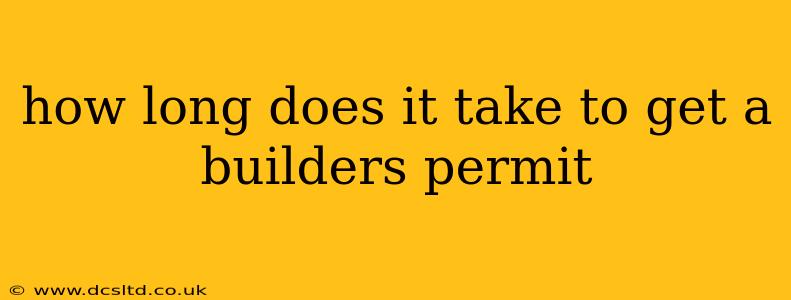Getting a builder's permit is a crucial step in any construction project, but the timeline can vary significantly depending on several factors. This guide breaks down the process and helps you understand what influences the duration.
What Factors Influence Permit Processing Time?
The time it takes to obtain a builder's permit is not a one-size-fits-all answer. Several key factors contribute to the overall duration:
-
Complexity of the Project: A simple shed permit will naturally take less time than a complex multi-family dwelling. Larger, more intricate projects require more extensive review and often involve multiple departments within the local government.
-
Local Government Efficiency: The efficiency of your local building department plays a significant role. Some municipalities are known for their streamlined processes and quick turnaround times, while others may be backlogged or have less efficient systems.
-
Completeness of the Application: Submitting a complete and accurate application is crucial. Missing documents, incomplete information, or ambiguous plans will inevitably delay the process. Thorough preparation is key to a smoother and faster approval.
-
Project Location: The location of your project can impact the permitting process. Projects in environmentally sensitive areas or those requiring additional approvals from other agencies may face longer processing times.
-
Time of Year: Building departments often experience heavier workloads during peak seasons. Submitting your application during a less busy period could potentially lead to faster processing.
-
Number of Revisions: If your initial application requires revisions or additional information, this will inevitably extend the overall timeline.
How Long Does It Typically Take?
While there's no single definitive answer, a general range for permit processing time is a few weeks to several months.
-
Simple Projects (sheds, minor renovations): These might take a few weeks to process, assuming a complete and accurate application.
-
Complex Projects (new homes, large additions): These can take several months, or even longer, particularly in areas with high demand or strict regulations.
It's always best to contact your local building department directly for the most accurate estimate based on your specific project. They can provide insights into current processing times and any specific requirements for your area.
What Happens During the Permitting Process?
The permit process generally involves these steps:
-
Application Submission: You'll submit a completed application, including detailed plans, specifications, and any necessary fees.
-
Plan Review: The building department reviews your plans to ensure compliance with building codes, zoning regulations, and other relevant ordinances.
-
Inspections: Once approved, inspections are scheduled at various stages of construction to verify compliance.
-
Permit Issuance: Upon successful completion of the plan review and inspections, the permit is issued.
How Can I Speed Up the Permitting Process?
-
Thorough Preparation: Ensure your application is complete and accurate before submitting it. Missing information will only cause delays.
-
Early Consultation: Contact the building department early in the planning stages to discuss your project and address potential issues upfront.
-
Professional Assistance: Consider hiring an architect or contractor experienced with local permitting regulations. They can navigate the process more efficiently.
What if My Permit Application is Denied?
If your application is denied, the building department will typically explain the reasons for denial. You can address these issues, revise your plans, and resubmit the application.
People Also Ask:
How much does a builder's permit cost?
The cost of a builder's permit varies widely depending on the project's size, complexity, and location. It's always best to check with your local building department for exact fee schedules. These fees are often based on the project's value or square footage.
Do I need a builder's permit for every project?
No, not every project requires a permit. Minor repairs and renovations often fall under exemptions. However, it's crucial to check your local building codes to determine whether a permit is required for your specific project. It is generally better to err on the side of caution and seek a permit when unsure. Working without a required permit can lead to significant penalties.
What happens if I start construction without a permit?
Starting construction without the necessary permits can result in stop-work orders, fines, and potential legal issues. It could also make it more difficult to sell your property in the future.
How long is a builder's permit valid for?
The validity period of a builder's permit varies depending on the local jurisdiction. Some permits have a limited validity period (e.g., 6 months or 1 year), requiring renewal if construction isn't completed within that timeframe. Others may be valid until the project is finished and final inspections are passed. Check with your local building department for specific details.
Remember, obtaining a builder's permit might seem daunting, but with proper planning and communication with your local building department, the process can be manageable and ultimately ensure a successful project.
